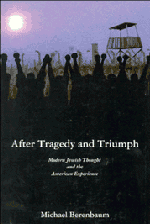Book contents
- Frontmatter
- Contents
- Foreword
- Introduction
- PART I THE HOLOCAUST IN CONTEMPORARY AMERICAN CULTURE
- 1 The Nativization of the Holocaust
- 2 The Uniqueness and Universality of the Holocaust
- 3 Public Commemoration of the Holocaust
- 4 Is the Centrality of the Holocaust Overemphasized? Two Dialogues
- 5 Issues in Teaching the Holocaust
- 6 What We Should Teach Our Children
- 7 The Shadows of the Holocaust
- PART II JEWISH THOUGHT AND MODERN HISTORY
- Notes
- Index
6 - What We Should Teach Our Children
Published online by Cambridge University Press: 06 January 2010
- Frontmatter
- Contents
- Foreword
- Introduction
- PART I THE HOLOCAUST IN CONTEMPORARY AMERICAN CULTURE
- 1 The Nativization of the Holocaust
- 2 The Uniqueness and Universality of the Holocaust
- 3 Public Commemoration of the Holocaust
- 4 Is the Centrality of the Holocaust Overemphasized? Two Dialogues
- 5 Issues in Teaching the Holocaust
- 6 What We Should Teach Our Children
- 7 The Shadows of the Holocaust
- PART II JEWISH THOUGHT AND MODERN HISTORY
- Notes
- Index
Summary
What are we to tell children about the murder of Jewish children? How do we teach trust in a dangerous world? Will sharing the story of this terrible tragedy frighten our children? Are we bequeathing to them a burden too great to bear?
This chapter asks painful and personal questions. It urges that the magnitude of evil in the Holocaust be communicated truthfully to our children at appropriate ages. Silence and denial only create more problems; falsification invites greater distrust.
As I noted in Chapter 4, Irving Greenberg has argued that no statement, theological or otherwise, should be made that could not be credible in the presence of burning children. What, then, should be said to living children about the world of burning children? We run major risks in telling children anything about the Holocaust. Yet if we do not tell them about it, we may be communicating something even more significant. (Witness the problem experienced by children of survivors whose parents have shrouded their past in silence.) To tell youngsters about the Holocaust is to challenge their sense of security in the world, to increase their suspicions about the enterprise of socialization and education, and to burden them with baggage we may be unable to lighten. We are caught on the horns of a dilemma from which there is not easy extrication.
Perhaps we have moved too quickly; perhaps we have begun by asking the wrong questions or by asking the right questions prematurely. American Jews are prone to live vicariously through their children, to ask the question: “what should we tell our children?” before confronting what we should tell ourselves.
- Type
- Chapter
- Information
- After Tragedy and TriumphEssays in Modern Jewish Thought and the American Experience, pp. 68 - 71Publisher: Cambridge University PressPrint publication year: 1990



